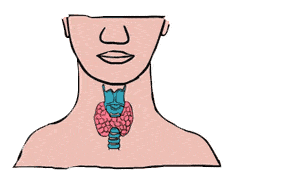As the largest endocrine gland in the human body, the thyroid gland is “H” shaped like a butterfly. It is divided into left and right lobes, connected in the middle. It is located in the front side of the upper part of the trachea in the lower part of the larynx. It can move up and down with the larynx when swallowing.

01
Which groups are vulnerable to thyroid disease?
1. People living in an iodine-deficient or iodine-rich environment
2. People with a family history of thyroid disease
3. People with autoimmune deficiency, such as People with rheumatism, rheumatoid arthritis, type 1 diabetes, etc.
4. People who are often emotionally unstable and easily out of control
5. The probability of women suffering from thyroid disease Higher than men, especially women with goiter, hyperthyroidism and hypothyroidism.
02
If the following symptoms are found
It is recommended to check the thyroid in time
1. Thickened neck
If you find that your neck looks thick, you should be alert to whether it is an enlarged goiter, which will seriously affect vocalization, swallowing and breathing.
2. Emotions are often out of control
Abnormal secretion of thyroid hormones can affect a person’s mood. Too little secretion can easily lead to depression or depression, and too much secretion can easily lead to irritability, irritability, or irritability. anxiety.
3. The skin becomes dry and rough
The decrease in thyroid hormone secretion will lead to the decrease of sweat and sebum secretion, resulting in dry and rough skin, and the nails will also become very brittle, Dry and yellow hair; increased thyroid secretion can make the skin moist and sweaty.
4. Significant weight gain or loss
If your diet and exercise habits have not changed, but your weight has increased or decreased suddenly, it is likely that your thyroid something is wrong. Excessive secretion of thyroid hormones will lead to a decrease in body metabolism, a decrease in consumption, and a significant increase in body weight; otherwise, the body weight will be significantly reduced.
5. Poor sleep
If you want to sleep every day, but you can’t get enough sleep, it’s time to sound the alarm. Because when there is too little thyroid hormone secretion, the body’s metabolic rate will slow down significantly, making people drowsy and listless every day; otherwise, it is easy to cause inability to fall asleep or reduce sleep time.
6. The heart beats too fast or too slow
Excessive thyroid hormones can significantly enhance the activity of the cardiovascular system, manifested as increased heart rate, which can lead to arrhythmia. Conversely, if thyroid hormones are insufficient, the heart rate will be slow.
7. Slow response, often forgetting things
Too much thyroid hormone will make people inattentive, while too little hormone will make people forgetful, unresponsive, many Women take these symptoms as signs of menopause, delaying diagnosis and treatment.
8. Abnormal appetite
I suddenly feel that the food tastes strange. It is very likely that the thyroid is making trouble. Too little thyroid hormone will affect our sense of taste and smell. If you suddenly increase your appetite and eat a lot without gaining weight, it may be caused by excessive secretion of thyroid hormones.